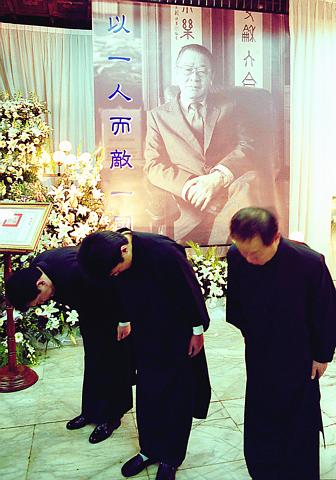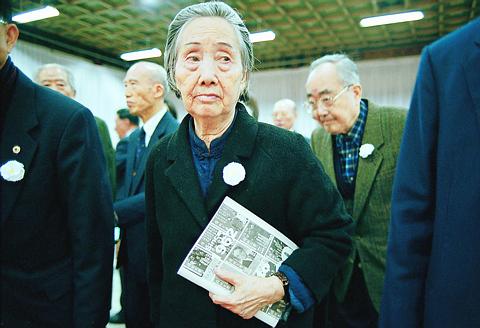Liu Shao-tang (劉紹唐), founder and publisher of the monthly magazine Biographical Literature (傳記文學), was eulogized yesterday during a funeral service in Taipei. Liu died on Feb. 10 of lung cancer, aged 80.
Historians that came to the service said Liu's efforts in collecting first-hand historical records on Chinese history from 1911 to the present day helped fill the gaps in official accounts of the same period.
"Liu has been dubbed as the head of the `unofficial Academia Historica,' and his contribution to the study of modern Chinese history is of paramount importance," said Chang Yu-fa (張玉法), a research fellow at the Institute of Modern History at Academic Sinica.

PHOTO: CHEN CHENG-CHANG, TAIPEI TIMES
Pouring rains and Chinese classical music greeted long lines of mourners who attended the service, held in the Chinghsing Hall at Taipei's First Funeral Parlor yesterday morning. Among those attending were officials, retired officials, scholars, and Huang's relatives and friends.
Two of Liu's old friends -- Liang Su-jung (梁肅戎), former Legislative Yuan speaker, and Pok Shau-fu (卜少夫), a veteran newsman -- gave their eulogies. Also invited to express his thoughts on Liu was Taipei Mayor Ma Ying-jeou (馬英九).
"I didn't see this occasion merely as an official engagement in which I as the Mayor of Taipei came to pay tribute to the founder of a monthly magazine published in Taipei. I am here to pay my respects to someone who has devoted his life to the development of culture," said Ma.

PHOTO: CHEN CHENG-CHANG, TAIPEI TIMES
In addition to praising Liu's devotion to the monthly magazine for the past 38 years, Ma expressed his own personal fondness of the publication.
"During a time when extracurricular reading materials were relatively scarce here in Taiwan, the magazine gave me an opportunity to probe the life histories of important figures in modern Chinese history. It served as the best of learning materials for me," he added.
Liu gained fame long before founding the magazine in 1962. In 1951, he published a book titled Out of Red China (紅色中國的叛徒) in which he recounted his experiences as a reporter at the Chinese Communist Party's (CCP) Xinhua News Agency, and his days in the CCP's People's Liberation Army (PLA).
Liu also described why it was he decided to leave the Communist Party after one year within the organization.
Since publication of the book, Liu was seen as a well-known anti-communist writer.
The US Information Service (USIS) later translated the book into more than ten languages as anti-communist propaganda, during a time when containment of communism was a mainstream doctrine in the West.
For historians, however, it is Liu's endeavor to found the magazine, focusing on biographic writing, that made him a key figure in preserving a record of modern Chinese history.
For this, Liu won a 1996 National Literary Award (國家文藝獎), conferred by the Council for Cultural Affairs.
Liu founded the magazine in Taiwan in June 1962, at the age of 40. It coincided with an era when publishing contemporary history could land an author in jail.
Until this year, the magazine has been published uninterruptedly for a total of 452 issues, relying on a single editor, no advertising revenue, and no subsidies. Cultural critics often described the magazine's longevity as "a miracle" in Taiwan's publishing industry.
Chang said Liu's decision to launch the magazine was influenced by Hu Shih (胡適), the great thinker. "Hu was an advocate of biographic writing. He believed that everybody should write their own stories to serve as eyewitnesses to their times. And Liu carried out Hu's dream," Chang said.
The majority of the articles released in the magazine were first-hand materials because many were accounts of personal experiences, chang said.
"These publications are very helpful to historians focusing on modern Chinese history," he said. "But for the existence of this magazine, I believe many of the precious historical accounts would have disappeared for good."
But historians also admit that the publication had its dark days -- Liu started the journal recording events and dissecting the actions of important figures, back during the time when Taiwan was still under martial law.
Chen San-ching (陳三井), a research fellow at the Institute of Modern History at Academic Sinica, gave a vivid example.
"When the magazine touched upon sensitive political issues, such as how many women Sun Yat-sen (孫中山), founder of the Republic of China, had in his life, the authorities were concerned, fingering Liu as a tool of the communists," Chen said.
But the magazine stands out as a pinnacle of achievement among those of its kind in Taiwan and China, Chen said. "In terms of content, quality and accuracy, the magazine is an unprecedented accomplishment."
On March 30, a panel discussion on the contribution of the magazine to the study of modern Chinese history will be held at the mayor's former residence, now a venue for cultural events.
According to the organizers of the event, a one-month exhibition on Liu's life will be held concurrently at the same venue.

AIR SUPPORT: The Ministry of National Defense thanked the US for the delivery, adding that it was an indicator of the White House’s commitment to the Taiwan Relations Act Deputy Minister of National Defense Po Horng-huei (柏鴻輝) and Representative to the US Alexander Yui on Friday attended a delivery ceremony for the first of Taiwan’s long-awaited 66 F-16C/D Block 70 jets at a Lockheed Martin Corp factory in Greenville, South Carolina. “We are so proud to be the global home of the F-16 and to support Taiwan’s air defense capabilities,” US Representative William Timmons wrote on X, alongside a photograph of Taiwanese and US officials at the event. The F-16C/D Block 70 jets Taiwan ordered have the same capabilities as aircraft that had been upgraded to F-16Vs. The batch of Lockheed Martin

GRIDLOCK: The National Fire Agency’s Special Search and Rescue team is on standby to travel to the countries to help out with the rescue effort A powerful earthquake rocked Myanmar and neighboring Thailand yesterday, killing at least three people in Bangkok and burying dozens when a high-rise building under construction collapsed. Footage shared on social media from Myanmar’s second-largest city showed widespread destruction, raising fears that many were trapped under the rubble or killed. The magnitude 7.7 earthquake, with an epicenter near Mandalay in Myanmar, struck at midday and was followed by a strong magnitude 6.4 aftershock. The extent of death, injury and destruction — especially in Myanmar, which is embroiled in a civil war and where information is tightly controlled at the best of times —

China's military today said it began joint army, navy and rocket force exercises around Taiwan to "serve as a stern warning and powerful deterrent against Taiwanese independence," calling President William Lai (賴清德) a "parasite." The exercises come after Lai called Beijing a "foreign hostile force" last month. More than 10 Chinese military ships approached close to Taiwan's 24 nautical mile (44.4km) contiguous zone this morning and Taiwan sent its own warships to respond, two senior Taiwanese officials said. Taiwan has not yet detected any live fire by the Chinese military so far, one of the officials said. The drills took place after US Secretary

THUGGISH BEHAVIOR: Encouraging people to report independence supporters is another intimidation tactic that threatens cross-strait peace, the state department said China setting up an online system for reporting “Taiwanese independence” advocates is an “irresponsible and reprehensible” act, a US government spokesperson said on Friday. “China’s call for private individuals to report on alleged ‘persecution or suppression’ by supposed ‘Taiwan independence henchmen and accomplices’ is irresponsible and reprehensible,” an unnamed US Department of State spokesperson told the Central News Agency in an e-mail. The move is part of Beijing’s “intimidation campaign” against Taiwan and its supporters, and is “threatening free speech around the world, destabilizing the Indo-Pacific region, and deliberately eroding the cross-strait status quo,” the spokesperson said. The Chinese Communist Party’s “threats